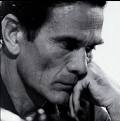 Among literary circles it is commonly undisputed that Pier Paolo Pasolini (1922 – 1975) is deemed as one of the most important Italian writers of the twentieth century. As a Poet, as a movie-director, as a novelist and as a journalist, Pasolini crossed many disciplines often intertwining them, always using them for his search of a scorching truth and a hidden beauty of reality.
Among literary circles it is commonly undisputed that Pier Paolo Pasolini (1922 – 1975) is deemed as one of the most important Italian writers of the twentieth century. As a Poet, as a movie-director, as a novelist and as a journalist, Pasolini crossed many disciplines often intertwining them, always using them for his search of a scorching truth and a hidden beauty of reality.
Pasolini’s artistic production is amazingly overwhelming: throughout his life he wrote several poems collections (the most comprehensive collection translated into English is probably the one by Norman MacAfee) as well as novels, theatre plays, screenplays, translations and essays; he directed 23 movies and was for some years a columnist for the eminent newspaper “il Corriere della Sera”.
But after almost 34 years since his death Italians seem hardly to remember him. No contemporary Italian writer has been actually following his arduous path (was it really possible after all?). His works are scarcely taught in high schools and his films only occasionally broadcast on some cable TV channels in the middle of the night. Young generations hardly know who Pier Paolo Pasolini was. To tell the truth this is no surprise, since Italian people never really liked him, partly because of his outspoken homosexuality and atheism, partly because like Pinocchio’s cricket, Pasolini was the conscience of Italy: he always managed to (fore)see an “inconvenient truth” – by borrowing Al Gore’s more recent words – where other people just wanted to believe in more reassuring lies. And like Pinocchio’s cricket, he was ruthlessly crushed.
However, despite the general oblivion Pasolini’s words still resound alive and truthful in the current Italian society, as well as his films, whose images and dialogues keep on aiming with vigorous levity at the core of the human condition. Unfortunately, most of the times the core of this condition may imply tragedy, like in several of his works or in the vision he had of the future of his own country. Just some months before his assassination, while explaining the effects of the industrialization on Italian people, Pasolini wrote:
It was impossible for Italian people to react worse than they are doing now to such a historical trauma. In a few years (especially in the centre and in the south) they have turned into a degenerated, ludicrous, monstrous and criminal society. You only need to go out in the streets to realize this. But of course, in order to understand the people’s changes, you need to love them. I, unfortunately, had loved these Italian people (…). It was a real love, rooted in my way of being. I have seen therefore “with my senses” the forced behaviour of the consumerist power recreating and deforming the conscience of the Italian people, up to an irreversible degeneration: which had not happened during the fascist period, during which the behaviour was completely dissociated by the conscience. (…). The fascist “patterns” were only masks to put on and take off.
Pasolini was convinced that the new totalitarian and (therefore neo fascist) consumerist power was going to permeate the entire country, but in a subtler and more refined way than Mussolini did, that is through a strong homologation and deculturation of people, which destroyed their personalities, their innermost lively differences and ideas. It is even too easy to compare Pasolini’s foreseeing with the present situation of Italy, whose public opinion is mostly under the control of Silvio Berlusconi’s TV empire.
In front of this dark premonition, like a Cassandra, Pasolini was aware of being alone. He probably knew that he could not be listened in a period, during which Italian people for the first time in their lives were taking advantage of the comforts created by the technological and scientific progress. But his solitude was even more radicated in his being, as he writes in the poem “The beautiful flags” in 1964:
(…) and, meanwhile, I am alone.
Lost in the past.
(because man has only a period, in his life).
All of a sudden my poet friends,
who share like me this ugly whiteness
of these Sixties
men and women just a bit elder
or younger – are there, in the sun.
I did not succeeded in having the grace
for holding them tight – in the shadow of a life
which takes place too attached to the radical sloth of my soul (…)
Nonetheless, Pasolini never resigned either to fatalism or to gloom and despair. In his poem “The reality” (1964) he made this clear:
(…) but love is worth everything I have.
Sex, death, passion, politics,
are the simple objects of which I give
my elegiac heart (…)
and in another of his early poems Pasolini declares:
only the loving, only the knowing
matters, not having loved,
not having known. Anguish is given by
the living of a consumed
love. The soul does not grow any longer.
Pasolini’s ashes are today his words full of life and liveliness, from which – as it happens to every great writer- his soul is reborn. It is up to us to listen to them and hopefully make treasure of his many works, together with his gentle gestures, his stern grace and his quiet talking, which we can still admire in the few interviews, now on the internet. In remembering his friendship with Pasolini Adolfo Chiesa says:
I have seen Pasolini laughing only once, or maybe just smiling. We sit outdoors at Rosati’s in Piazza del Popolo with Moravia and Laura Betti. That afternoon Moravia is cheerful, talkative, wild, as he now and then happens to be. We talk about travelling, we fancy going to Africa, China, while Betti is joking about the fact that she has not left his home in via del Babuino for ages. Then a long-haired young man passes by, with tight jeans, the look full “of life” typical of those characters that fascinate Pasolini. And the writer starts at staring him, he gets distracted and looses the conversation so that Moravia and Betti pull him by the sleeve, they even elbow him ..
Pasolini eventually stops observing the young man, comes back to us, looks at the three of us and smiles, a warm smile, difficult to forget.
Pasolini used to say that a man’s life can only be written ultimately only after his death: no actual biography can ever be inscribed before the final fullstop. This came for him tragically in the night of November 2, 1975 on a beach near Rome (in a location so typical of his novels) where he was brutally murdered. His assassination still remains an unsolved case, as several other killings of those years, dominated by still obscure connections among Italian secret services, neo-fascist terrorists and mafia leaders.
The key to solving Pasolini’s murder is likely to have already been destroyed, but Pasolini himself seem miraculously indicate us the way to better understand his end, when he illustrates in an article published on the “Corriere della sera” in 1974 what a coup in Italy is:
I know.
I know the names of the people responsible for what is called the coup (and which is actually a series of coups established as a system of protections of the power).
I know the names of the people responsible for the bomb-attack in Milan on December 12 1969.
I know the names of the people responsible for the bomb-attack in Brescia and in Bologna in the first months of 1974. (…)
I know. But I have got no evidence. I have got not even a clue.
I know because I am an intellectual, a writer, who tries to follow what is going on, know all that is written about, imagine all that is not known or is passed into silence: a writer who coordinates facts even far from each other, who puts together the disorganized and fragmentary pieces of an entire consistent political scene, a writer who re-establishes the logic where arbitrariness, lunacy and mystery seem to rule.







[…] versione inglese è qui. English version is here. By lorenzo capanni, on July 9th, 2009 | Category: […]